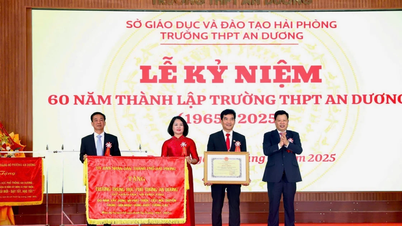Ensuring objectivity and transparency
At the National Economics University, Mr. Le Anh Duc said that the school's admission methods will be converted to the same 30-point scale. This means that scores from different exams, international certificates, or different admission methods will be converted for comparison and common admission.
"This conversion helps make the admission process fairer, allowing candidates to compare their scores with different methods," Mr. Le Anh Duc emphasized, giving an example: If last year, a major had a benchmark score of 26 based on a specific admission combination, this year, after conversion, the benchmark score could be 25 but still considered based on the total number of targets.
In fact, a candidate can register for many different methods - from high school graduation exam, high school transcript, international foreign language certificate, to ability assessment test scores, thinking assessment. Mr. Le Anh Duc said that if there is no reasonable conversion method, comparison and selection will easily fall into a state of unfairness.
Currently, each admission method is designed with its own structure and scoring scale. IELTS certificate is calculated on a scale of 0-9, school report card score is on a scale of 10, high school graduation exam is on a scale of 30, and the competency assessment test is on a scale of 1,200.
Without a “common yardstick”, schools will find it difficult to determine the true abilities of candidates when competing for the same major. Therefore, converting scores is not only a technical requirement in admission but also a basis to ensure transparency, objectivity and fairness for all candidates.
When all candidates, regardless of the selection method, have a common measure, the risk of bias for a group of candidates will be significantly reduced. In addition, this method helps ensure scientific recruitment. Conversion based on a unified standard contributes to accurately reflecting the academic ability and foreign language ability of candidates, instead of letting each scale operate separately.
The conversion table also helps candidates easily orient their registration strategy. Many students often hesitate between submitting an IELTS certificate, using their school report card scores or waiting for their graduation exam results. When there is a clear conversion table, candidates can calculate and choose the optimal option, avoiding registering based on emotions.
This is also a solution to increase flexibility for universities. Through conversion, schools can both diversify their recruitment sources and maintain fairness in assessment. This is especially important in the context of increasingly fierce competition for admission.
In the trend of diverse enrollment, converting scores between methods is not only a technical solution but also an effective management tool. If applied consistently, this will be the “key” to contributing to improving the quality of university enrollment in the coming years.

Don't "close the deal" too soon
Along with the requirement that schools convert admission scores to equivalent scores between admission methods, the new point of admission this year is to eliminate early admission. According to Mr. Le Anh Duc, in previous years, many universities implemented early admission (based on academic records, foreign language certificates, competency assessment test scores, etc.). This helps to relieve pressure on candidates, because a part of the quota has been "reserved" early.
However, in 2025, the Ministry of Education and Training will "tighten" regulations on early admission; schools will not be allowed to announce results in advance, at which time all admission requests will be processed at the same time to create transparency and synchronize admission time.
From this regulation, candidates are no longer sure of early admission like last year, so they tend to register more as a "backup". This invisibly causes the number of wishes to increase dramatically. Therefore, it is understandable that a candidate can register 20-30 wishes. However, in reality, they only enroll in 1 school.
Mr. Le Anh Duc realized that the above regulation will create more fairness in enrollment, limit the situation of schools racing to enroll students early, causing information interference. Candidates will have more time to consider, not being "closed on" too early when their actual ability after the graduation exam is not clear.
Suggesting some solutions, Mr. Le Anh Duc discussed that the Ministry of Education and Training should continue to strengthen the smart virtual filtering system. Higher education institutions should announce the predicted benchmark scores according to many scenarios, supporting candidates to consider.
As for candidates, they need to have a smart strategy for choosing their wishes: not just chasing quantity but also calculating the level of suitability with their abilities, field of study, and career trends.
Mr. Le Anh Duc said that for a long time, candidates registering for admission to the National Economics University's own system have applied fees according to their records (not according to their wishes). Candidates are allowed to register for a maximum number of wishes and admission subjects. In addition, the National Economics University is determined to follow a stable admission direction and will notify candidates 1 year in advance to ensure their initiative.
Source: https://giaoducthoidai.vn/cong-bang-hon-trong-tuyen-sinh-dai-hoc-post744344.html


![[Photo] General Secretary To Lam receives Vice President of Luxshare-ICT Group (China)](https://vphoto.vietnam.vn/thumb/1200x675/vietnam/resource/IMAGE/2025/11/15/1763211137119_a1-bnd-7809-8939-jpg.webp)


![[Photo] Prime Minister Pham Minh Chinh meets with representatives of outstanding teachers](https://vphoto.vietnam.vn/thumb/1200x675/vietnam/resource/IMAGE/2025/11/15/1763215934276_dsc-0578-jpg.webp)





































































































Comment (0)